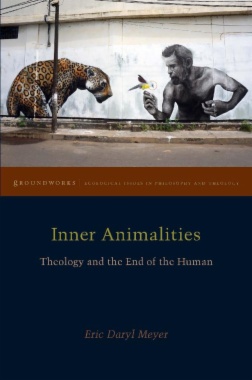Most theology proceeds under the assumption that divine grace works on human beings at the points of our supposed uniqueness among earth’s creatures—our freedom, our self-awareness, our language, or our rationality. Inner Animalities turns this assumption on its head. Arguing that much theological anthropology contains a deeply anti-ecological impulse, the book draws creatively on historical and scriptural texts to imagine an account of human life centered in our creaturely commonality.
The tendency to deny our own human animality leaves our self-understanding riven with contradictions, disavowals, and repressions. How are human relationships transformed when God draws us into communion through our instincts, our desires, and our bodily needs? Meyer argues that humanity’s exceptional status is not the result of divine endorsement, but a delusion of human sin. Where the work of God knits human beings back into creaturely connections, ecological degradation is no longer just a matter of bodily life and death, but a matter of ultimate significance.
Bringing a theological perspective to the growing field of Critical Animal Studies, Inner Animalities puts Gregory of Nyssa and Karl Rahner in conversation with Jacques Derrida, Giorgio Agamben, Kelly Oliver, and Cary Wolfe. What results is not only a counterintuitive account of human life in relation with nonhuman neighbors, but also a new angle into ecological theology.
- Cover�������������������������������
- Inner Animalities�������������������������������������������������������������������
- Title�������������������������������
- Copyright�������������������������������������������
- Dedication
- Contents����������������������������������������
- Introduction����������������������������������������������������
- Part I����������������������������������
- 1 Gregory of Nazianzus: Animality and Ascent����������������������������������������������������������������������������������������������������������������������������������������������������
- 2 Gregory of Nyssa: Reading Animality and Desire����������������������������������������������������������������������������������������������������������������������������������������������������������������
- 3 The Problem of Human Animality in Contemporary Theological Anthropology�������������������������������������������������������������������������������������������������������������������������������������������������������������������������������������������������������������������������������������������
- Part II�������������������������������������
- 4 Animality and Identity: Human Nature and the Image of God�������������������������������������������������������������������������������������������������������������������������������������������������������������������������������������������������
- 5 Animality in Sin and Redemption�������������������������������������������������������������������������������������������������������������������
- 6 Animality in Eschatological Transformation����������������������������������������������������������������������������������������������������������������������������������������������������
- Conclusion����������������������������������������������
- Acknowledgments�������������������������������������������������������������
- Notes�������������������������������
- Bibliography����������������������������������������������������
- Index�������������������������������

